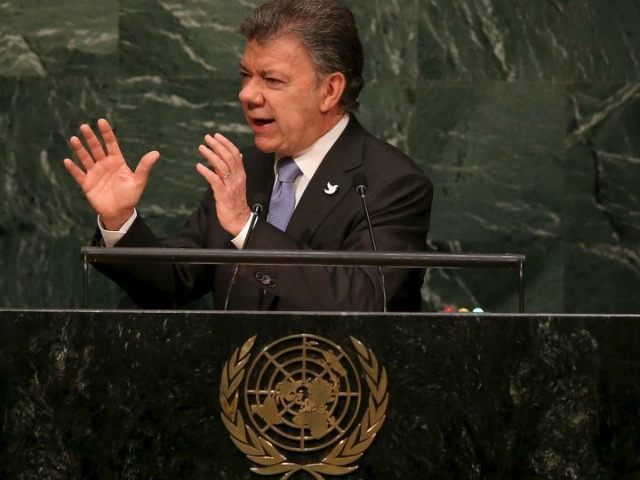“Colombia’s conflict is on the path to a genuine solution,” President Juan Manuel Santos told the United Nations General Assembly Tuesday in a celebratory speech announcing the provisional deal the Colombian government reached with the Revolutionary Armed Forces of Colombia (FARC) terror group last week.
“We will put an end to the longest and final armed conflict on the Western hemisphere because achieving peace in Colombia and any part of the world is a responsibility that nobody must shirk,” Santos told the audience, describing peace as “a process of collective cultural transformation which begins with individual spiritual change.” He told the audience he realized he sounded enthusiastically optimistic, but gave a reason: “in Colombia, in less than six months, the bells will ring out again proclaiming the time of peace has come.”
Colombia has been negotiating with the leadership of the FARC, the world’s wealthiest non-jihadist terrorist organization, for months in Havana, where the Cuban government has given the terrorist leaders safe haven. Last week, in a press conference in the Cuban capital, Santos stood alongside the head of the FARC, known as “Timochenko,” and announced that they had agreed on some preliminary provisions for a long-term peace deal. The peace deal would be completed and take effect in March 2016.
The deal, Santos told the UN, would create “a system of transitional justice which ensures that there is no impunity for the most serious crimes committed during the conflict.”
“It is the first time that a government and an illegal armed group … is creating an accountability system before a domestic court for international crimes and other serious crimes,” he added, suggesting the deal “could serve as a model for other armed conflicts in the world.”
“A Colombia at peace will be a positive factor for the world,” he concluded.
The deal would create two judicial systems to handle FARC terrorists and would demand that all terrorists hand in their weapons and face justice–a provision to which the FARC agreed. Those who are suspected of crimes against humanity would be handled by a different tribunal than those who have committed “political crimes.” The fighters in the latter category may face only community service, not jail time.
Critics argue that the categorization of crimes as “political” or not is a mistake, as crimes like kidnapping and drug trafficking may be dismissed as “political.”
“The government, the President of the Supreme Court, and the Attorney General have accepted from the start that kidnapping and drug trafficking will be forgiven as political crimes,” said former Colombian President and current Senator Álvaro Uribe regarding the deal.

COMMENTS
Please let us know if you're having issues with commenting.